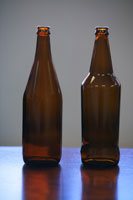
Top stories






More news





ESG & Sustainability
#Sona2026: President announces crisis committee to tackle SA's water challenges










It involves the setting up of huge Sorting, Overpacking and Culling (SOC) sites linked to each of SAB's seven breweries around South Africa to sort, recycle and replace the old quart bottles. The first SOC site was linked to the Newlands Brewery in May 2007, and the final site is for the Polokwane Brewery.
By the time Project Calabash is completed, a total of 3,2-million man-hours of temporary work will have been done, and 90,000 tons of glass recycled - and SAB will have invested approximately R1,2-billion.

SAB embarked on Project Calabash for reasons of contemporisation and differentiation: the old bottle shape, which had been in use for 40 years, was tired and old-fashioned, and there was an opportunity to modernise SAB's mainstream beer offerings; also, there was a need to meet new packaging trends, and give SAB a better marketing platform and edge in the marketplace.
"Packaging and pack formats are an integral part of our brand and product presentations," says SAB communications manager Janine van Stolk. "At SAB we strive constantly to anticipate and respond to the needs of our customers and consumers by providing formats that enhance the brand experience and ensure efficient and successful distribution into the market.
"This has been a mammoth undertaking, the likes of which has never been seen before. We've needed to find enormous temporary premises because our breweries did not have enough space, employ many temporary workers (most of whom have been recruited from local communities at each site), and handle the kind of transport and site logistics that an army would be proud of.
"Critics predicted that we would never be able to pull it off - but we're in the home straight now, and it has been fantastically successful," Van Stolk notes.
For Project Calabash project manager Piet Pretorius, one of the greatest accolades he has received so far is this snippet of feedback: "Project Calabash is a non-event - it just happened."
"With this feedback, one is very proud. It is a clear indicator of how smoothly and successfully the project has gone so far," says Pretorius, paying tribute to his 17-person project team - six of them permanently allocated to Project Calabash - for their contribution to the project. "Without these people, this couldn't have worked."
According to Van Stolk, the importance of Project Calabash to SAB cannot be overstated: "The 750ml returnable bottle is very important to SAB's packaging mix. Over 80% of beer sold is in returnable bottles, of which quarts make up the majority. The new returnable quart format is both an environmentally friendly and economically attractive alternative for both our consumers and our customers in trade. This has been a visionary undertaking in increasing the appeal and relevance of our products and it goes without saying, then, that Project Calabash has significant implications for SAB's business success."